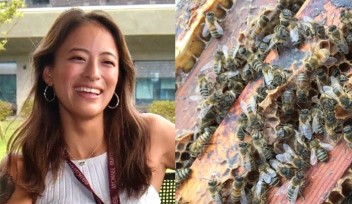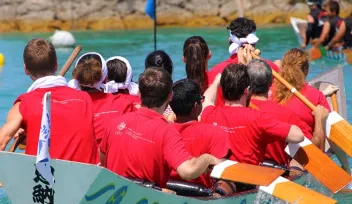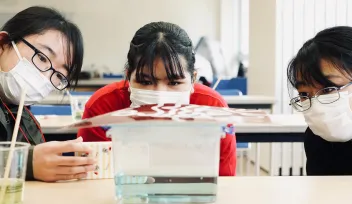Column: Supporting Researchers - Postdoc Development Specialist at OIST

The latest OIST column in the Asahi Shimbun GLOBE+ is out now. This month, Tomomi Okubo, Manager of the Media Relations Section interviewed Dr. Irina Filonova, Postdoc Development Specialist at OIST.
The article was published in Japanese but you can read the original English version below.
Supporting researchers
What is a postdoctoral fellow? If you hear the word "postdoc " and know that it stands for postdoctoral fellow or postdoctoral scholar, you are probably quite familiar with the world of universities and academia. I'm embarrassed to admit that I had never heard of the term until I started working at OIST, probably because I spent my college years leisurely in the literature department.
A postdoctoral scholar is a fixed-term researcher who is engaged in research under the supervision of a faculty member at a university or research institution after obtaining a doctoral degree.
Currently, about 200 postdocs are working at the Okinawa Institute of Science and Technology Graduate University (OIST). All the postdocs are fixed-term employees and engage in their research activities with their future careers in mind. After a few years, they will move on to different universities, research institutions, or other paths.
As you can imagine, postdocs are in a difficult position under the pressure of finding a job at a different workplace in few years, and in order to do so, they have to make as high of achievement on their research as possible.
In addition, 80% of the postdocs at OIST are non-Japanese at OIST, and they are expected to adapt to life in a foreign land with a different culture quickly and produce results in their research, though many of them are unable to communicate in Japanese.
Postdoc Career Support Program
It is important for OIST to enhance the environment for these postdocs, who are under so much pressure, and to help them achieve success. That is why OIST has a Postdoc Career Development Program that provides workshops, events, seminars, and one-on-one advice for postdocs. In this article, I would like to introduce to you a person who plays an active role in this program, Dr. Irina Filonova.
Irina, a Postdoc Development Specialist, is originally from Russia. After earning her PhD in neuroscience in the United States, she took a postdoc position at UT Southwestern Medical Center, TX, where she studied the brain, trying to make a pathway to an autism treatment.
I asked her why she switched her career from a researcher to a support for the researchers
“I was feeling lonely doing research because I was always confined to the laboratory. I wanted to be with people and helping them directly.”
Irina also introduced that she was not good at public speaking when she was graduate student. Now speaks with no hesitation in public and gives lectures at workshops in Japan and overseas. She has even planned and organized a workshop at the 2020 AAAS Annual Meeting by American Association for the Advancement of Science, where she also served as a speaker and moderator herself. So, when she told me that she was not a good presenter when she was a postdoc, I could hardly believe it.
It was during that time when Irina received mentoring for career development at her university and became interested in the job of a mentor.
Irina said, "I think women in general don't know themselves very well. Look up the term 'Imposter Syndrome.' It's a psychological tendency to underestimate oneself, and it's overwhelmingly common among women. Listening to the women around me, it occurred to me that women might have this tendency in the world of science as well. Of course, I was the exact same way.”
“It was then that I learned about positive psychology, which opened my eyes. It's the idea of focusing on the good instead of trying to fix your shortcomings.”
Inspired by her mentor, Irina created a place where female researchers staff members could meet regularly to talk at the university where she was a postdoc. Watching the participants fostering friendships with each other and gaining more and more confidence was a turning point in Irina's life.
"A well-known phenomenon in the world of science, especially in biomedical area is the 'leaky pipe' phenomenon. It’s a phenomenon in which the number of men and women are almost the same when they earn PhD, but as their careers progress, the number of women decreases rapidly. The number of men who become professors is overwhelmingly higher than women," Irina explains.
She added, "Researchers are under a lot of pressure to be smart and act smart and to do long hours of experiments and research vigorously to produce better and more papers. Women in academia often face a very hard choice: starting a family or dedicating all their time to science. This is not an acceptable choice as women should be well supported to do both women often give up on starting a family because of this. And I feel that this is not well known in the society, and that there is not a good support system for women.”
Realizing the effectiveness of peer support from women in similar positions, Irina immediately started a group of postdoc women when she joined OIST. Now, she has started a group of women in administrative positions as well as researching positions.
When I asked Irina if there were any challenges specific to OIST, she said, "OIST values diversity, so we have people from different backgrounds working together, including origin, culture, gender, sexual orientation and gender identity, and research specialties. In that sense, one of the things I want to focus on at OIST is furthering our understanding of cultural intelligence, also known as CQ”.
Having lived in Japan for 3 years as her first time, Irina says she loves Japan. Her dream for the future is to get more involved with Japanese female researchers and contribute to raising the CQ of the Japanese scientific community as a whole. “When I was invited by the diversity promotion office of a national university in Japan to teach a leadership development seminar for female researchers and listened to the participants, I realized that culturally, Japan in particular has many barriers to overcome for women. I am confident we can overcome these obstacles together. ”
Although Irina does not speak Japanese, she thinks that it is meaningful to be involved in the Japanese research community with an approach from global perspective. She also added that there are many things to learn from Japan as well.














